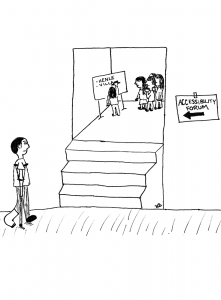 By now, you have probably seen the Facebook cover photos and captions discussing accessibility on campus. Maybe you scrolled past these posts, thinking they did not apply to you.
By now, you have probably seen the Facebook cover photos and captions discussing accessibility on campus. Maybe you scrolled past these posts, thinking they did not apply to you.
You might be correct. The vast majority of Hoyas will go to a party at a top-floor Henle and simply grunt at the amount of exertion required to climb the stairs. Many of us, after getting an email that a speaker is on campus, will not have to think twice about if we can access the event location. But not all Hoyas have this privilege. For this reason, the Georgetown University Student Association is working to educate the student body and receive feedback about accessibility on the Hilltop.
In any situation, if an unaffected majority permanently disregards minorities, oppression becomes rampant. Any injustice on campus should affect all of Georgetown; we are men and women for others.
Last week, our community affirmed this commitment by standing in solidarity with students of color. With this support, student activists spurred action from the President’s Working Group on Slavery, Memory and Reconciliation and accomplished a significant first step to improve race relations on campus. However, our commitment as Hoyas calls on us to be allies to all underrepresented communities. For too long, we have ignored the struggles of many of our peers, naively accepting the premise that since Georgetown meets Americans with Disabilities Act minimum requirements, our campus is completely accessible. Why does our sense of obligation and responsibility not transfer to accessibility issues? I think it is because most of us just do not understand the reality.
The ADA was signed into law in 1990 in order to prevent discrimination and provide equal opportunity for employment, transportation, state and local government and more. But accessibility is so much more than ADA compliance.
If there is one accommodating apartment in Alumni Square, but your best friend is hosting a party in an apartment that is only reachable by stairs, can we call our campus accessible? If there is a handicap-friendly stall in the restroom, but the narrow, heavy-set doors are impossible for you to open, can we call our campus accessible? If you are severely depressed and Counseling and Psychiatric Service takes weeks to see you for an appointment; if you having immense trouble focusing, but the Academic Resource Center insists that you provide more proof that you require accommodation, how can we call our campus accessible?
One confidential, paraphrased quote in particular we received from our recent Accessibility at Georgetown University survey best explains what our goal is for the future of accessibility at Georgetown: “Let’s aim for accessibility to not just satisfy a code, but to satisfy the human who it is for.”
Every single room in every single building must be accessible, or else there is more work for us to do.
A Georgetown alum recently visited my “Health Promotion and Disease Prevention” class. As someone who experienced Georgetown from a motor chair, he told us that it is pointless for the able-bodied population to guess what needs to be ameliorated.
Therefore, GUSA invites the community — students, faculty, staff and administrators, alike — to voice its concerns, suggestions and experiences with us through our accessibility survey or reach out to the GUSA accessibility representative directly . Without your help, we cannot know what to fix or even where to start.
As a member of the able-bodied majority, my life will not dramatically change if we add more elevators and ramps, or require all on-campus extracurricular events to provide accommodation. I can very easily avoid the Facebook posts, the survey or even this op-ed.
But we are Hoyas, and we should be living up to our commitment as men and women for others. We should be mobilizing for this unfairness, as we have for issues of race, class and freedom of speech, among others. We should not withhold that collective power from the injustices that need it most. When students rise together, we are unstoppable.
Danielle Zamalin is a sophomore in the School of Nursing and Health Studies. She is the GUSA undersecretary of disability affairs. GUSA’s Accessibility Survey can be found on their website.













